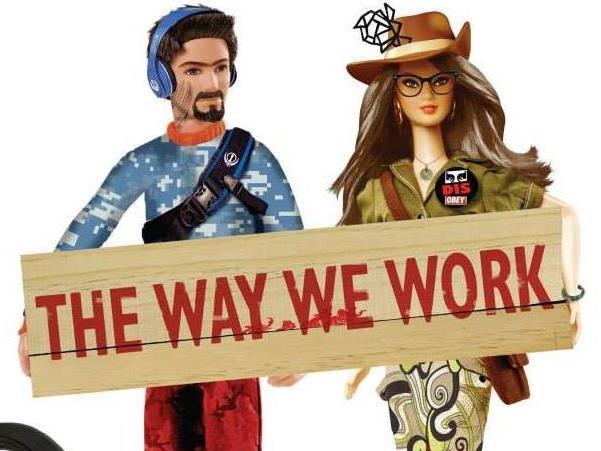For an undertaking that has such a ubiquitous presence in many people’s lives, the very quintessence of work is something that is not accorded the significance it deserves. As Griffith Review editor, Julianne Schultz, says in her prologue to Griffith Review’s latest edition: ‘One thing remains constant, work is essential to economic wellbeing and meaning, so getting it right is important.’
Griffith Review devotes its 45th edition to the pressing questions and emergent challenges of the day – all within the prism of something we take for granted everyday. Australia’s ageing population that is increasingly beginning to resemble that of an inverted pyramid begets the question: will older Australians be able to find consistent and flexible work to fund themselves? How do we address the gender pay gap which has increased since the last decade? What is the future face of the Australian workforce when all the manufacturing and agricultural jobs have given way to work in the services?
Responses to these very issues come in all shapes and forms. In the essay that kick-starts the collection, Ashley Hay looks at the rapidly changing face of the workforce by drawing parallels with living organisms’ biological adaptation to climate change. Hay details a changing landscape that means people now work for reasons beyond that of generating income and where insecure jobs such as limited-term contracts are on the rise. Like creatures that fail to adapt to rising sea levels and the sudden onset of natural disasters, there are species of worker bees who will cease to do what they have always taken to be their job. In this, Hay questions the validity of her job as a writer.
‘I torture myself with how limited a skill set I have. I talk to people about what they do. I make sentences. I make stories. If it’s a day for fiction, I make things up. What else might I possibly do?’
Virginia Lloyd’s essay ‘The Illusionist’s Trick’ acts almost as an antidote to Hay’s anxieties. Although Lloyd concedes that being a freelance writer and editor is about ‘as rare as the common cold’, she touches on the same current of immutable change that Hay talks about. However, for Lloyd, this development is manifest in creations such as Skype that allow her to be in two places at once and is something to be lauded.
Gideon Haigh touches on the social consequences of the dwindling automotive industry – attaching a personal element to the all too often politicised chestnut of Australia’s manufacturing industry – while David Peetz covers a similar trend by outlining the rise in services jobs that involve a large degree of personal interaction.
The challenges of the ageing population are addressed in a few pieces within the edition. Darryl Dymock’s essay ‘Working Late’ reasons why many older people are increasingly open to working into their later years and delineates the options available to them. Encore careers – that is, a new career after the main mid-life vocation – are not uncommon, while consultancy roles and part-time work build on past accumulated knowledge with the added benefit of autonomy and flexibility.
In a twist on this same theme, Mandy Sayer sheds light on the scantly reported exponential rise in the number of self-funded retirees cultivating and/or selling drugs. Inspired to chart the phenomenon of drug peddling elders after the discovery that her father was one, Sayer is nonjudgemental and forthright in her appraisal of today’s pensioners. ‘It’s a generation that is not accustomed to making sacrifices or ‘going without’. It’s also, paradoxically, the generation that began, and continues to fuel, the self-help industry. Put the two together and we have the perfect storm.’
If the construct of work is so vital, the denial of it is highly damaging. In ‘Refuge Without Work’, Peter Mares humanises the plight of thousands of asylum seekers who are on bridging visas and as a result, denied the right to work.
While many mothers are not outwardly denied the right to work in the same way as asylum seekers, gendered societal expectations, conditioning and crises in confidence result in them undervaluing their abilities and repudiating work. In her piece of reportage ‘Bending Over Backwards’, Rebecca Huntley details the misfortune of women being forced out of the middle class due to them having babies, talking themselves into low-status jobs for the purported flexibility they offer, and setting themselves up for potential financial hardship and depression later in life when their children grow up and their marriages break down.
In the piece ‘Beyond The Stethoscope’, Lucy Mayes is emboldened to investigate why doctors take their lives at a rate higher than many other occupations after she bears witness to her husband’s disillusionment at working to the prescribed standards of the sector. What she finds is an incredibly profits-driven field where scant time is devoted to bringing compassion and mindfulness into the medical practice. Mayes’ piece is a powerful one; inspiring and depressing in equal measure.
Looking further afield, Gerhard Hoffstaedter takes a mirror to the unconscionable working conditions in Malaysia many South East Asian refugees labour under ‘to a nation that does not know their names, their stories nor their contributions.’ In ‘Downstairs in Ethiopia’, Andrew Belk uses the prism of his personal experiences as a filmmaker to recount the calculated, almost shrewd practice of documenting poverty. The regular South African practice of hiring domestic help is placed in a global context as Hayley Katzen ponders why Australians have, for most part, never given in to the trend of hiring people to do their housework.
The pieces of fiction within the edition each touch on the question of work in distinct, illuminating ways. Elizabeth Woods’ ‘Fit In Or F**k Off’ is a timely elegy to the mining boom of recent years centred by a female protagonist in a traditionally male-dominated field. Paddy O’Reilly’s ‘The City Circle’ utilises the gentle nature of a trundling tram as a counterpoint to explore the rigours of work.
Interspersed in and amongst the collection are empowering displays of what certain heavyweights are doing in the course of their work, as well as heartbreaking portrayals of what the inability to work and increasingly reprehensible working conditions are doing to the populations of the world who find themselves excluded from the nascent pursuit of resources and political power. As in all of its collections, the latest Griffith Review provides readers with the tools to go forth into the world armed with an increased understanding of realities so disparate from their own and what they need to do to bridge the inordinate gaps that still prevail.
Rating: 4 stars out of 5Griffith Review #45: The Way We Work
Edited by Julianne Schultz
Paperback
264pp
RRP: $27.99
ISBN: 9781922182425
Text Publishing






